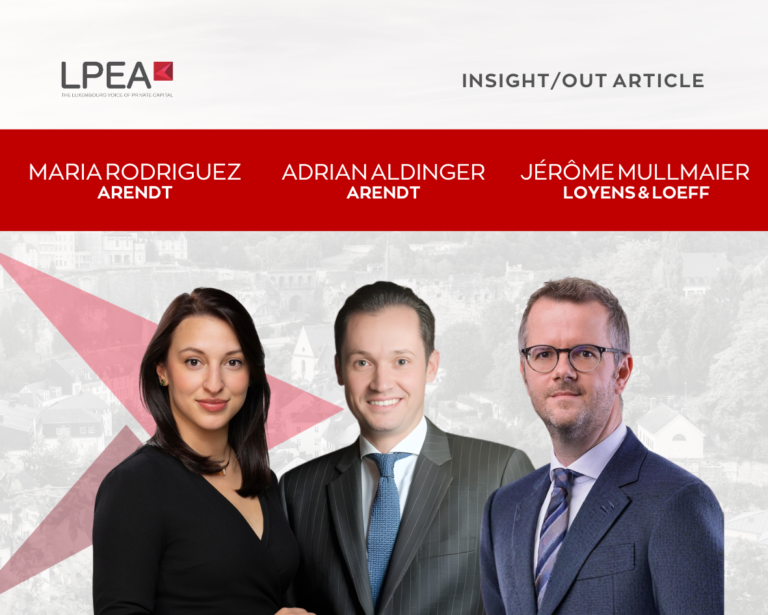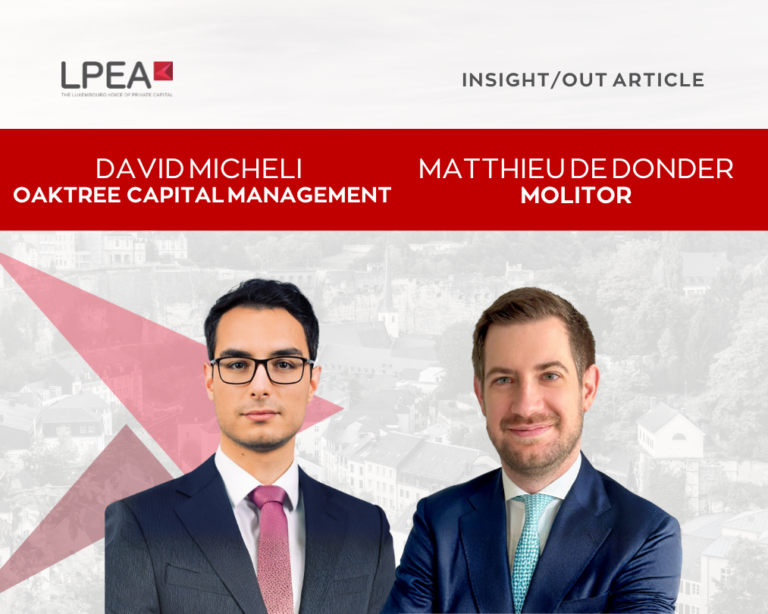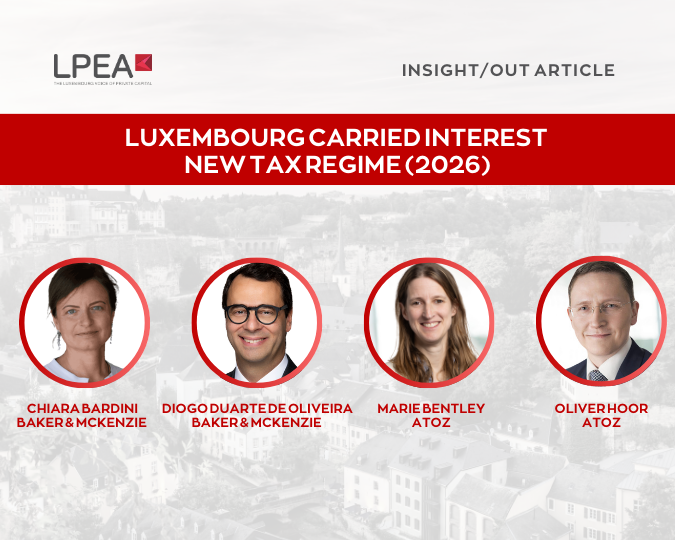Interview of Farhad Karim and Abdelkader Belkacem by Stephane Pesch, CEO at LPEA as featured in Insight Out Magazine #22
Interview of Farhad Karim, Chief Operating Officer at Blackstone Europe and Abdelkader Belkacem, Conducting Officer in Charge of Risk Management, on Blackstone’s investment strategy and its Luxembourg and global footprint.
What’s the story behind Blackstone?
Farhad Karim: The story of how the firm was built is extraordinary. Blackstone was founded by Stephen A. Schwarzman and Pete Peterson in 1985 with each investing $200,000. Fast forward 37 years and the firm’s AUM has reached $915 billion. Steve is still Chairman and CEO and I think the key to our success is that we still operate with the same values and culture as he instilled in the business at the beginning. It’s a unique achievement to keep that core mission intact through such incredible growth and our culture is critical to everything we do.
The growth of the firm has been pretty extraordinary and it’s in no small part down to our President, Jon Gray. We’ve just had the two best quarters in our history and now invest across a wide range of asset classes including real estate, private equity, growth, special situations, credit, infrastructure, life sciences, and secondary investing. We are the largest owner of commercial real estate in the world, our hedge fund business is the world’s largest discretionary investor, and our credit team is a major provider of credit for small, middle-market and other companies. Amazing when you consider how it all started.
In how many countries is Blackstone currently active, and what is your footprint in Luxembourg?
Abdelkader Belkacem: We’ve been in Luxembourg for more than twenty years which, considering Blackstone is less than 40 years old, shows just how hugely important the country is to our history as well as our future. Our corporate operations in Luxembourg, Blackstone Europe Fund Management was established in May 2017 and provides alternative investment fund management services to each of our Blackstone segments/business units. (Abdelkader and Farhad, both pictured, are part of the governance team) and Revantage, the company we set up to support our portfolio companies operationally, combined are 350 employees and are a majority-female team. That puts it close to London in terms of real estate headcount, which gives you an idea of its importance to our European operations.
We also launched our regulated AIFM, Blackstone Europe Fund Management or BEFM, in 2017, which has 27 full-time employees across risk management, valuation, compliance, AML, marketing and oversight of portfolio management.
Luxembourg is perfectly placed as a hub for us in Europe. The geographical position and transport connections, the multilingual nature of the country, and its position a center for knowledge and skills in Europe, mean that we can attract exceptional talent. These factors make Luxembourg a unique and attractive place for us and the reason why we plan to continue growing our presence here in future.
Globally, Blackstone has an on-the-ground presence across 20 countries.
What sectors do you focus on, and what new trends have you seen emerge over the last years?
FK: Our investment approach is laser focused on ‘high-conviction themes’. Within those themes, the investment teams at the firm are always evaluating new opportunities. We are clear about what we believe are the fast-growing parts of the economy with strong tailwinds. From last-mile logistics to content creation, these themes span a broad array of sectors that touch all parts of Blackstone. I will give you one example: digital transformation. Covid-19 accelerated what was already a meaningful shift towards digitalisation.
The firm identified digitalisation as a megatrend that is here to stay and has already invested in several companies at the forefront of this transformation. This includes the healthcare software company HealthEdge, the dating platform Bumble, and the datacentre operator 21Vianet. Our investment teams are also identifying areas that benefit from this trend by proxy, which is why we have made significant investments in film studio and content creation space which can benefit from the growth in popularity of streaming services.
Concentrating on these high conviction themes means we can focus on areas where we have strong knowledge and expertise. We don’t look to boil the ocean. We can also knowledge-share between these specific investments which builds strength and expertise across the board.
Blackstone’s support for female entrepreneurs is another important focus. From Bumble, which is led by Whitney Wolfe Herd, to Sarah Blakely’s shapewear company Spanx, to Hello Sunshine, the media company founded by Reese Witherspoon: we regularly see women-led businesses perform well and prove great investments for us. Empowering more female leadership in business is important – and it’s also generating returns for our investors.
Your offer for institutional investors is well known. Do you offer services for individual investors too?
FK: Yes. Our Private Wealth Solutions group provides eligible individual investors with access to Blackstone’s expertise across alternative investments.
We have seen exceptional growth in this part of the business in recent years. More and more individual investors are looking to alternatives in their search for yield in the current market environment. There is a desire to diversify portfolios away from traditional stock and bond investments, and into areas like real estate and private credit where we offer products they can access.
We believe that both real estate and private credit have the potential to provide investors with options for income in a high-inflation environment. We favour a long-term view in our investments, and we really focus on getting the right leadership to manage our offering for our clients – both factors in making these products successful, which is why our strategies for individual investors in real estate and credit have grown so rapidly. We always look to do more on this front.
We think that in the current environment, alternative funds should be considered as a core strategic component for individual investors. Many advisors have never allocated to an alternatives fund and we think that’s a missed opportunity for them. The opportunities are significant, and we strongly believe that over the next decade we will see that trend change even more than it already has.
One of the most significant recent trends in investing has been ESG. How does Blackstone approach this theme, and do you see ESG as a factor in future investment decisions?
FK: ESG is mission-critical to Blackstone. Our leadership has always instilled a strong culture to conduct business in the right way. We have a team of more than 30 people focused on ESG at Blackstone and hundreds more in our portfolio companies. These teams are growing as we help our portfolio companies generate value by reducing carbon emissions and boosting diversity and strong governance.
I think one of the reasons Private Equity is well-placed for value creation through ESG is because we touch so many companies across so many sectors. Blackstone supports more than 300,000 jobs across the world and our commitment to ESG is unequivocal. This gives Blackstone the ability to knowledge-share to make sure if one portfolio company is doing something great, that is rolled out right across the portfolio and the firm spreads best practice.
This is endemic to the way we do business, but we also set hard targets. We have a target to reduce carbon emissions by 15% across all new investments in the aggregate where we control energy use starting in the U.S. and Europe. We’ve also set a goal to achieve one-third diverse representation on new controlled portfolio companies’ boards. That’s focused on the companies we invest in but we also do a lot at Blackstone internally. Our Women’s Initiative, Diverse Leaders Programme, and Veterans Network are each helping us to expand opportunities to more and more people and driving us to a more inclusive company. That’s the right thing to do and it’s great for the culture and the future of our firm.




